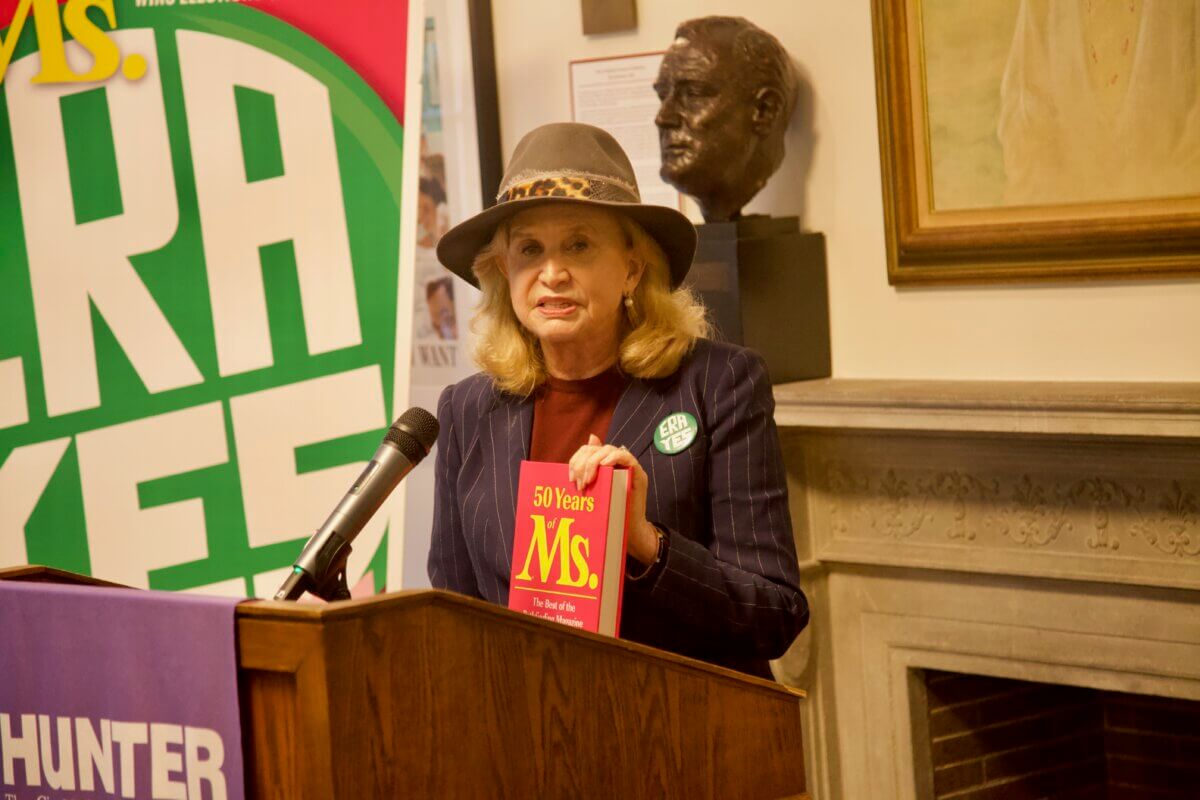The decades-long push to ratify the Equal Rights Amendment (ERA) in the U.S. Constitution continued in Manhattan Monday.
Former East Side Congress Member Carolyn Maloney joined Gloria Johnson, Tennessee U.S. Senate candidate and member of the “Tennessee Three,” as well as several feminist advocates, journalists and a constitutional law expert to discuss the ongoing fight for the proposed amendment.
The Sept. 18 event — held a day after the 234th anniversary of the U.S. Constitution’s ratification — took place at the Roosevelt House Public Policy Institute at Hunter College for the occasion of honoring the 50th anniversary of Ms. Magazine, a publication with a rich history of documenting the fight for women’s rights.
“Women and girls are not equal under the law. That’s why more than ever, we have to ratify the Equal Rights Amendment to our U.S. Constitution,” said Johnson, the state senator who was invited to speak after she was nearly expelled from the Tennessee General Assembly earlier this year when she and two of her colleagues protested gun violence.
In recent years, political momentum has been building to enshrine the proposed constitutional amendment that would explicitly codify sex equality into constitutional law. Maloney is the chair of the ERA Coalition, an organization dedicated to enacting the amendment.
The goal: “To get a vote before the 2024 election on the ERA so that we can hold people accountable, and vote for them if they support us and against them if they don’t,” said Maloney.

Some legislators and feminist advocates believe that enacting the constitutional amendment provide a path forward to protecting reproductive rights in the aftermath of last year’s Supreme Court decision overturning of Roe V. Wade. The speakers said that a constitutional amendment is crucial toward providing a foundation to advancing future gender equality laws at the federal and local level.
“There’s been a lot of progress made in gender justice in the last 50 years, but all of these federal laws are a patchwork. They are not durable, and they are also subject to the whims of Congress and the political process,” said Ting Ting Cheng, director of the ERA Project at Columbia Law School.
A key part of the discussion involved how to advance a campaign to get Congress to enact the ERA. over the next year. Though Congress passed the ERA in 1972, the amendment had only received ratification by 35 of the requisite 38 states to activate the amendment by the 1982 ratification deadline. Since 2017, Nevada, Illinois and Virginia have each approved the amendment — which Democrats argue is enough to validate the amendment.
Democrats in the Senate and House have introduced two joint resolutions that would declare that the measure has already been ratified and render it enforceable.
“We know one major thing. It has been ratified. And now we’ve gotta make sure it is recognized as ratified, and that it is placed directly into the Constitution as the 28th Amendment,” said Feminist Majority Foundation President and Cofounder Eleanor Smeal.
Smeal said the plan to get the bill to the floor of the Republican-controlled House is to get a majority of the chamber’s members to sign a discharge petition that could force a floor vote.
“That’s how we got the ERA in the past,” Smeal said.
At the event, Smeal shot back at opponents of the measure who have argued that the future of the amendment is legally dubious because 38 states did not ratify the ERA by its initial deadline when it passed in 1972. That deadline was in the preamble, not in the text of the bill, she said.
“There is no time limit,” she said.
The panel solicited audience members to join the Sign4ERA petition, which is geared at presenting support to Congress.






































